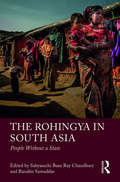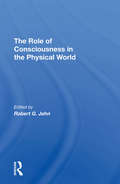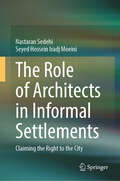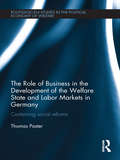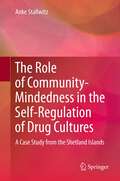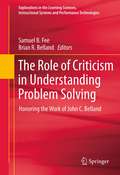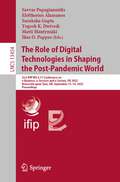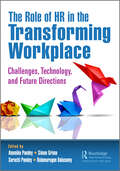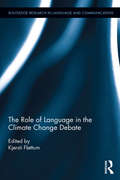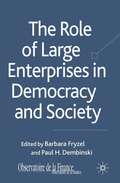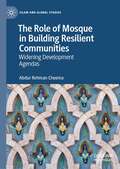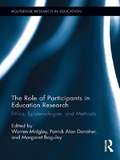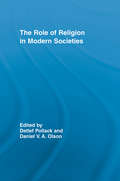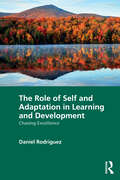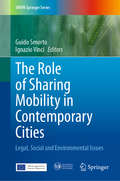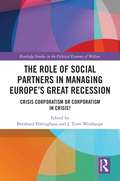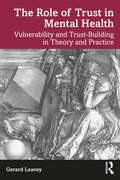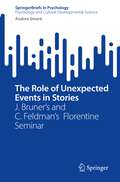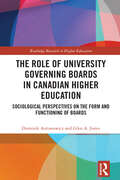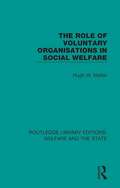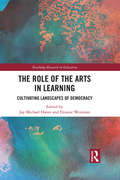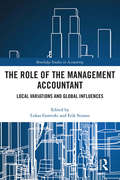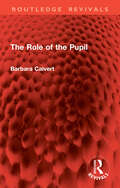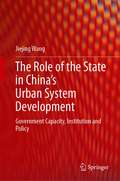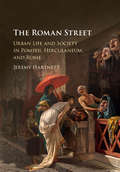- Table View
- List View
The Rohingya in South Asia: People Without a State
by Ranabir Samaddar Sabyasachi Basu Ray ChaudhuryThe Rohingya of Myanmar are one of the world’s most persecuted minority populations without citizenship. After the latest exodus from Myanmar in 2017, there are now more than half a million Rohingya in Bangladesh living in camps, often in conditions of abject poverty, malnutrition and without proper access to shelter or work permits. Some of them are now compelled to take to the seas in perilous journeys to the Southeast Asian countries in search of a better life. They are now asked to go back to Myanmar, but without any promise of citizenship or an end to discrimination. This book looks at the Rohingya in the South Asian region, primarily India and Bangladesh. It explores the broader picture of the historical and political dimensions of the Rohingya crisis, and examines subjects of statelessness, human rights and humanitarian protection of these victims of forced migration. Further, it chronicles the actual process of emergence of a stateless community – the transformation of a national group into a stateless existence without basic rights.
The Role Of Consciousness In The Physical World: The Role Of Consciousness In The Physical World
by R. G. JahnDo we live in a deterministic universe that passively awaits our observation and utilization? Or do we create our own reality in the process of observing it? These questions, writes the editor, traditionally have been the domain of philosophers, theologians, and romantic writers; in recent years, though, they have become a concern of scientists. Ad
The Role of Architects in Informal Settlements: Claiming the Right to the City
by Seyed Hossein Moeini Nastaran SedehiWith over one billion people worldwide living in informal settlements and enduring substandard housing conditions, these areas present one of the greatest urban challenges of our time. The existence of informal settlements is deeply intertwined with global issues such as climate change, war-induced displacement, and colonialism. As sustainability becomes a central focus in various disciplines, including architecture, the path to sustainable urban development lies in addressing the problems of informal settlements. Architecture's relevance to this discourse is paradoxically highlighted by its perceived 'irrelevance'. Informal settlements are often overlooked as legitimate sites for architectural practice. This neglect stems from two assumptions: first, architecture's traditional dependence on power and capital, isolating the marginalised who rarely have the chance to receive architectural services; and second, architecture's perceived incapability to address urban-scale infrastructural problems, and thereby its reduction to aesthetic creativity and form making. This book challenges architecture's focus on the 'centre' and its lack of ambition for creating a pervasive impact on cities. Instead, it highlights the profession's potential to serve the common good and address urban-scale infrastructural issues and proposes the effective engagement of architects in informal settlements. Drawing on Henri Lefebvre’s dichotomy of margin versus centre in urban spaces, informal settlements are interpreted as spaces on the city’s periphery, created by the marginalised with limited access to power, capital, and authority. By revisiting interrelated concepts such as the production of space, the right to the city, social architecture, and spatial agency within the context of informal settlements, the book claims a space for architectural practice in these areas. It incorporates discussions on insurgent citizenship and critiques of the self-help approach, contextualising its arguments with architectural intervention precedents from around the world. The book concludes with a brief manifesto on practising architecture in informal settlements. The book aspires to inspire architecture students, practitioners, and researchers to explore the profession’s potential in social problem-solving and to push the boundaries of practice towards inclusiveness for all urban inhabitants.
The Role of Business in the Development of the Welfare State and Labor Markets in Germany: Containing Social Reforms (Routledge Studies in the Political Economy of the Welfare State)
by Thomas PasterThis book assesses the role of employers in the development of welfare state and labour market institutions. Building on an in-depth analysis of Germany, a market economy known to often provide economic benefits to firms, this book explores one of the most contested issues in the comparative and historical literature on the welfare state. In a departure from existing employer-centered explanations, the author applies new empirical data to contend that the variation in acceptance of social reform depends more on changes in the types of political challenges faced by employers, than on changes in the type of institutions considered economically beneficial. Covering major reforms spanning more than a century of institutional development in unemployment insurance, accident insurance, pensions, collective bargaining, and codetermination, this book argues that employers support social policy as a means to contain political outcomes that would have been worse, including labour unrest and more radical reform plans. Using new and controversial findings on the role of employers in welfare state development, this book considers the conditions for a peaceful coexistence of a generous welfare state and the business world. The Role of Business in the Development of the Welfare State and Labor Markets in Germany will be of interest to students and scholars of welfare and social policy politics, political economy and European politics.
The Role of Community-Mindedness in the Self-Regulation of Drug Cultures
by Anke StallwitzThis book analyzes heroin users and the drug subculture on the Shetland Islands, an area known for its geographical remoteness, rural character and relative wealth. It fills the scientific gap created by the conventional research in heroin research, which is usually conducted in urban areas and relies on treatment and prison populations. Based on qualitative, in-depth interviews with twenty-four heroin users, this book depicts and analyzes the nature and historical development of the local heroin scene. It illustrates the features and internal structures of the subculture, and it examines the manner in which both are influenced by the location-specific geographical, cultural and socio-economic conditions. It thus reveals complex causal associations that are hard to recognize in urban environments. Complete with a list of references used and recommendations for future research, this book is a vital tool for progressive and pragmatic approaches to policy, intervention and research in the field of illicit drug use.
The Role of Criticism in Understanding Problem Solving
by Samuel Fee Brian BellandIn 1991, Denis Hlynka and John Belland released Paradigms Regained, a well received reader for graduate students in the field of educational technology. The Role of Criticism in Understanding Problem Solving updates some of those ideas initially proposed in Paradigms Regained, and extends the conversation into the contemporary discourse regarding problem based learning (PBL). Paradigms proposed the idea of criticism as a third method for the conduction of educational research, the first two being qualitative and qualitative. The concept of criticism as a tool for research is not well established in educational technology, although it is well established in other educational research traditions such as Curriculum Studies. Unfortunately, it is not always clear how criticism can be applied. This book views criticism as a way to step back and look at an educational intervention within educational technology through a particular critical lens. Criticism is viewed as a valuable approach to guiding meta analyses and theoretical studies, serving to prevent the proverbial "spinning of the wheels" that often happens in educational research. By indicating new potential research questions and directions, criticism approaches can invigorate educational research. This book revisits the ideals of criticism in order to establish their usefulness for studying educational technology interventions to support problem based learning. First, a few foundational chapters set the stage for the conversations on criticism. Then, the role criticism can play in enhancing analysis and interpretation of the PBL literature is explored. Finally, case studies addressing the central concepts of the text are presented and dissected. This book represents a complete overhaul and rethinking of the use of criticism as a method for understanding and furthering the research area of PBL within the field of Educational technology.
The Role of Digital Technologies in Shaping the Post-Pandemic World: 21st IFIP WG 6.11 Conference on e-Business, e-Services and e-Society, I3E 2022, Newcastle upon Tyne, UK, September 13–14, 2022, Proceedings (Lecture Notes in Computer Science #13454)
by Yogesh K. Dwivedi Matti Mäntymäki Ilias O. Pappas Suraksha Gupta Savvas Papagiannidis Eleftherios AlamanosThis book constitutes the refereed proceedings of the 21st IFIP WG 6.11 Conference on e-Business, e-Services, and e-Society, I3E 2022, which took place Newcastle-upon-Tyne, UK, in September 2022. The 37 papers presented in this volume were carefully reviewed and selected from 72 submissions. They were organized in topical sections as follows: Artificial intelligence; Data and Analytics; Careers and ICT; Digital Innovation and Transformation; Electronic Services; Health and Wellbeing; Pandemic; Privacy, Trust and Security.
The Role of HR in the Transforming Workplace: Challenges, Technology, and Future Directions
by Simon Grima Balamurugan Balusamy Anamika Pandey Suruchi PandeyChanging technology and the growing demand for workforce intelligence have ushered in a new era of human resource (HR) transformation and have compelled HR professionals to continually ideate, innovate, and adapt. This book covers the changing role of HR in the transformation of workplaces to be successful globally. With challenges come new opportunities for HR to completely transform. Currently, technology is considered to be an extension of human beings rather than an external component, which makes people less socially connected. Physical, psychological, and financial well-being in this machine-led world is driving the agenda of HR. Individuals with complex business requirements and long-term goals must coexist with the gig economy, flexible workplaces, and changing priorities. This book precisely addresses these issues. More innovations are needed to create solutions for an ever-growing digital world. This book, therefore, explains how the role of HR executives must be to understand how emerging technologies are affecting company culture, strategy, operational plans, and the hiring of future talent. Crafting a career path for knowledge workers with challenging roles with fulfilling job aspects remains a puzzle. Keeping people engaged and happier is one of the major challenges that HR professionals experience. Different generations in the workplace with differing styles of learning, communication, and dynamic expectations add to these challenges. HR functions must keep evolving to overcome these challenges to transform the workplace, and it is essential to recognize how HR can act as a strategic business advisor through the effective use of technology. This book provides practical advice in these areas. In addition, this book helps professionals, researchers, and practitioners understand the way advanced technology and automation are influencing HR practices and processes in the new normal. The topics are designed to capture the most advanced technology-based HR practices for workplace transformations in industry and academia. This book assembles contributions from experts in HR planning, human capital management, business analytics, people analytics, predictive analysis, and automation from across the world, contributing their knowledge to identify the different attributes of the above-mentioned field of study. The book’s chapters are designed and organized pragmatically to enhance the reader’s experience and interest, reflecting upon a few untouched segments in the HR domain such as HR data privacy, data security, diversity, and inclusion using explainable AI (XAI), blockchain, and metaverse.
The Role of Language in the Climate Change Debate (Routledge Research in Language and Communication)
by Kjersti FlottumThis volume takes a distinctive look at the climate change debate, already widely studied across a number of disciplines, by exploring the myriad linguistic and discursive perspectives and approaches at play in the climate change debate as represented in a variety of genres. The book focuses on key linguistic themes, including linguistic polyphony, lexical choices, metaphors, narration, and framing, and uses examples from diverse forms of media, including scientific documents, policy reports, op-eds, and blogs, to shed light on how information and knowledge on climate change can be represented, disseminated, and interpreted and in turn, how they can inform further discussion and debate. Featuring contributions from a global team of researchers and drawing on a broad array of linguistic approaches, this collection offers an extensive overview of the role of language in the climate change debate for graduate students, researchers, and scholars in applied linguistics, environmental communication, discourse analysis, political science, climatology, and media studies.
The Role of Large Enterprises in Democracy and Society
by Paul H. Dembinski Barbara FryzelUses both political and democratic studies perspectives as well as economic, philosophical and managerial to provide a practical insight into the issues like the extensive economic power of large enterprises and changing balance of power between public and private sector, regulation and the governance of large private entities.
The Role of Mosque in Building Resilient Communities: Widening Development Agendas (Islam and Global Studies)
by Abdur Rehman CheemaThis book is about the role of the mosque in the aftermath of the 2005 earthquake in Pakistan. Disasters give rise to a situation where people from different parts of the world, quite unfamiliar with each other, come into contact to save lives, provide necessities such as food and shelter, rebuild homes and enable community recovery. During these challenging times, community-based religious institutions such as churches, mosques and temples are a practical choice for reaching people living nearby to fulfil their needs. The book shows the contributions of the mosque as a physical, spiritual and social place for improving the knowledge and practice of disaster risk reduction and management including the COVID-19 pandemic. It also illuminates the widening role of religion in development. The book reinforces the case for broader engagement with all community-based religious institutions. The book is of interest to academics in diverse fields including development studies, disaster studies, sociology, anthropology, religion, Asian studies, emergency and disaster management. It will also of interest to the professional staff of disaster management authorities, public sector, bilateral and multilateral aid allocation and implementing agencies and those of humanitarian organizations.
The Role of Participants in Education Research: Ethics, Epistemologies, and Methods (Routledge Research in Education #87)
by Margaret Baguley Patrick Alan Danaher Warren MidgleyThis book explores different perspectives on the role, influence and importance of participants in education research. Drawing on a variety of philosophical, theoretical and methodological approaches, the book examines how researchers relate to and with their participants before, during, and after the collection and/or production of data; reimagining the rights of participants, the role/s of participants, the concept/s of "participant" itself.
The Role of Religion in Modern Societies (Routledge Advances in Sociology)
by Detlef Pollack Daniel V. A. OlsonDoes modernization lead to the decline of religion? This question lies at the centre of a key debate in the sociology of religion. During the past decade American scholars, using primarily American data, have dominated this debate and have made a strong case that the answer to this question is no. Recently, however, a new crop of European scholars, working with new sources of European data, have uncovered evidence that points toward an affirmitive answer. This volume pays special attention to these trends and developments to provide the reader with a more well-rounded understanding of the many ways in which religion interacts with modernization. Respected scholars such as David Voas, Steve Bruce and Anthony Gill examine modern societies across the world in this splendid book which will interest sociologists, political scientists, historians, and theologians in equal measure.
The Role of Self and Adaptation in Learning and Development: Chasing Excellence
by Daniel RodriguezThis book introduces readers to Psychoadaptation—a general model of change that stresses the importance of experiencing disequilibrium in the development of a healthy Self—and applies it to a range of examples across the academic, sport, and health domains. Built upon his studies of human development and learning, Daniel Rodriguez offers an overview of a model of change with a specific focus on the development of Self and conceptions of Self. The author begins by focusing on academic topics such as conducting research, teaching, and being a student, before highlighting examples from sport and health. With a clear and engaging tone, each chapter highlights how the theory behind Psychoadaptation can be applied across a variety of contexts and in the modern world. The result is a solid balance of scientific theory and practical application that readers can relate to their own circumstances and research. Offering a unique conceptualization to development, learning, and behavior change, this is a useful resource for students and scholars within these areas, as well as clinicians working in the fields of health and sport. It will also benefit individuals looking to embark upon their own journeys to Self-development.
The Role of Sharing Mobility in Contemporary Cities: Legal, Social and Environmental Issues (UNIPA Springer Series)
by Guido Smorto Ignazio VinciThe emergence of sharing mobility is having a profound impact on urban landscapes. In fact, it is deeply affecting the traditional organization of local services by calling into question how urban transportation is planned, and by redesigning city spaces. Further, by connecting people to shared assets, services or both, sharing mobility is poised to facilitate the more efficient use of underutilized resources, becoming a powerful tool for economic growth and social inclusion, while also contributing to sustainability. That being said, the economic, social and spatial impacts of sharing mobility have not been sufficiently investigated, and so far, the evidence is mixed. From a normative standpoint, while it is relevant to better understand the relations between sharing mobility, the city and the environment, it is also of crucial importance to define new policies and sound rules for sharing mobility in urban areas. Against this backdrop, this book adopts a multidisciplinary perspective to explore the role that sharing mobility can play in the creation of more just and sustainable cities.
The Role of Social Partners in Managing Europe’s Great Recession: Crisis Corporatism or Corporatism in Crisis? (Routledge Studies in the Political Economy of the Welfare State)
by J. Timo Weishaupt Bernhard EbbinghausThis comprehensive study of the Great Recession and its consequences provides comparative analyses of the extent to which social concertation between government, unions, and employers varied over time and across European countries. This edited volume – a collaboration of international country experts – includes eight in-depth country case studies and analysis of European-level social dialogue. Further comparisons explore whether social concertation followed economic necessity, was dependent on political factors, or rather resulted from labour’s power resources. The importance of social partners’ involvement is again evident during the Covid-19 pandemic. Examining contemporary crises, the book will be of considerable interest to scholars and students of public and social policies, comparative political economy, and industrial relations – and more broadly to those following European and EU politics.
The Role of Trust in Mental Health: Vulnerability and Trust-Building in Theory and Practice
by Gerard LeaveyThis book offers a comprehensive examination of trust and its relationship with mental illness and wellbeing.Engaging with a broad range of mental health research, theory, and practice through various transdisciplinary theoretical models of trust, this book highlights the social and family contexts surrounding the making and breaking of trust and mental health. It examines various sociological conceptual and theoretical frameworks of risk and trust while also engaging with evolutionary perspectives on the human need for cooperation and trust. The author describes how, in a world of constant connectivity, the drawing of boundaries assigns some people as strangers, using stigma as a form of power. The book concludes by considering the future of mental health and where trust-building may be possible. Each chapter is interspersed with observations and insights from the author’s personal research covering many populations, communities and issues over several decades.Drawing on a wide range of interdisciplinary literature, the book will be of interest to mental health practitioners, researchers, and scholars interested in the psychosocial aspects of mental illness and stigma.
The Role of Unexpected Events in Stories: J. Bruner’s and C. Feldman’s Florentine Seminar (SpringerBriefs in Psychology)
by Andrea SmortiThis book stems primarily from the intention to make public the seminar entitled "Narratives and Cultural Psychology" held by J. Bruner and C. Feldman in May 2000 in Florence. This seminar represents the point of view of these two authors, at an important moment in their scientific and human careers, on two themes: narratives and interpretative communities.The central concept on which this book works is the Aristotelian concept of peripeteia which, born in the world of art, is developed by Bruner in the field of cognitive and cultural psychology and by Feldman in the concept of interpretative community.Thus the first purpose of this book is to analyze the role and usefulness of this concept in the study of the world of stories and cultureThe second aim of this book is to explain, clarify and comment on the concept, the theoretical assumptions and the key words used by the two authors, while also exploring the issues addressed. In this way, the author wanted to reflect on what contribution this seminar offers today to the theme of narratives and cultural psychology and what the future prospects might be.This book is aimed at students and scholars interested in exploring the role that stories play in human culture.
The Role of University Governing Boards in Canadian Higher Education: Sociological Perspectives on the Form and Functioning of Boards (Routledge Research in Higher Education)
by Glen A. Jones Dominik AntonowiczThis book explores the historical and social foundations of Canadian higher education and provides a detailed analysis of university boards within this broader context of university governance. By examining rich empirical data from a sociological perspective, it offers unique insights into the role of boards, and the structures and practices that frame their work. It explores board composition, the professional backgrounds of board members, how members perceive their role, and the complex relationships between the board and the university president. The authors also compare and contrast the Canadian experience with governance reforms in Europe and other regions over recent decades. Drawing on multiple theoretical perspectives, the authors provide a nuanced analysis of the role of boards in terms of oversight, protecting university autonomy, representing societal interests, and dealing with increasing complexity and expectations. This innovative, original study makes an enormous contribution to our understanding of the role and work of Canadian university boards, and to international scholarship on higher education governance. It will appeal to scholars and researchers with interests across higher education, international and comparative education, and the sociology of education.
The Role of Voluntary Organisations in Social Welfare (Routledge Library Editions: Welfare and the State #14)
by Hugh W MellorOriginally published in 1985 The Role of Voluntary Organisations in Social Welfare considers the voluntary sector as a provider of social welfare. The book asks the fundamental questions for those involved in social welfare: what should the role of this voluntary sector be, and what should its relationship be with the government sector? Reporting on extensive original research undertaken for the Joseph Rowntree Memorial Trust, the study examines the functions, staffing, funding and control of voluntary organisations. It looks at the relationship with the government sector, explores the increasingly important questions of accountability and discusses future prospects.
The Role of the Arts in Learning: Cultivating Landscapes of Democracy (Routledge Research in Education #22)
by Jay Michael Hanes Eleanor WeismanGrounded in philosophy from John Dewey and Maxine Greene, this book sheds light on difficulties and practicalities of examining culture and politics within the realm of interdisciplinary education. Providing both theoretical and concrete examples of the importance of a contemporary arts education, this book offers imaginative ways the arts and sciences intersect with democratic learning and civic engagement. Chapters focus on education in relation to diversity, apprenticeship, and civic engagement; neuroscience and cognition; urban aesthetic experience and learning; and science and art intelligence.
The Role of the Management Accountant: Local Variations and Global Influences (Routledge Studies in Accounting)
by Erik Strauss Lukas GoretzkiThere is considerable national variation in the professionalization and status of the management accountant. Although researchers from different countries have contributed to our knowledge about tasks and roles, we have limited insights into the development, education, and socio-cultural influences in different countries and surprisingly little is known about the local and national contexts in which these roles are learned and performed. This book bridges this research gap using two complementary perspectives. The first part explores management accountants in a range of different national contexts, providing information about country-specific historical developments and educational standards as well as specific roles and tasks. The second part focusses on important global developments that will increasingly impact management accountants in the future, such as sustainability, the financial crisis, technology and changing roles. By combining local context with a global overview, this insightful volume provides an agenda for future research which will be of great interest to scholars and advanced students in management accounting throughout the world.
The Role of the Pupil (Routledge Revivals)
by Barbara CalvertAlthough the role of the teacher has been extensively explored, the role of the pupil has received very little attention in the sociology of education. This authoritative study, The Role of the Pupil (first published in 1975), is about what it means to be a school pupil, exposed to the often-conflicting expectations of teachers, parents and peers.The author has drawn on a wide range of sociological literature to focus not only on the basic role of pupil as learner but also on other important but neglected facets of the pupil role. The pupil appears as child-to-be-socialised, as teacher’s adversary, as savage-to-be-civilised, as customer, as wrong-doer. These viewpoints provide a fresh perspective on pupil relationships within and beyond the classroom. This book will be of interest to students and researchers of education and sociology.
The Role of the State in China’s Urban System Development: Government Capacity, Institution and Policy
by Jiejing WangThis book investigates how the state intervenes in the urban system in China in the post-reform period. To do so, it constructs a conceptual framework based on the perspective of political hierarchy, suggesting that the state power is hierarchically organized in China’s urban system, leading to variations in urban government capacities among cities. The book reveals that the state has largely achieved the goal of its national urban system policy to “strictly control the scale of large cities” resulting in the under-development of the large cities if they are mainly developing according to the market force. However, this has become less influential with the advances toward a market economy. Further, state regulation and policies have reduced the gaps between cities at the top and bottom of the urban hierarchy. The book argues that the Urban Administrative System (UAS) is an important tool for the state to regulate urban system development, and the administrative level has a significant effect on urban growth performance. It contends that China’s urban system is strongly shaped by the omnipresent state through the UAS, which hierarchically differentiates between the urban growth processes. By controlling the administrative-level upgrading process, the state can prevent the size and number of cities from increasing too rapidly.This theoretical and empirical enquiry highlights the fact that the hierarchical power relations among cities and the resulting variations in urban government capacities are the key to understanding the role of the state in China’s urban system development in the post-reform period.
The Roman Street
by Jeremy HartnettEvery day Roman urbanites took to the street for myriad tasks, from hawking vegetables and worshipping local deities to simply loitering and socializing. Hartnett takes readers into this thicket of activity as he repopulates Roman streets with their full range of sensations, participants, and events that stretched far beyond simple movement. As everyone from slave to senator met in this communal space, city dwellers found unparalleled opportunities for self-aggrandizing display and the negotiation of social and political tensions. Hartnett charts how Romans preened and paraded in the street, and how they exploited the street's collective space to lob insults and respond to personal rebukes. Combining textual evidence, comparative historical material, and contemporary urban theory with architectural and art historical analysis, The Roman Street offers a social and cultural history of urban spaces that restores them to their rightful place as primary venues for social performance in the ancient world.
